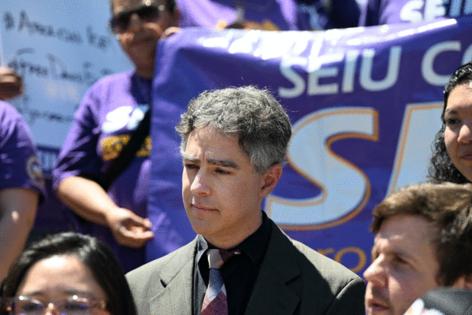Judge voices skepticism toward state's move to comply with ICE subpoena: 'Am I going to believe my own lying eyes?'
Published in News & Features
DENVER — A Denver judge appeared unpersuaded Monday that a federal subpoena referencing child abuse gave Gov. Jared Polis the latitude to side-step Colorado law and turn over personal information about undocumented children and their sponsors to immigration authorities.
“It’s one of those instances where — am I going to believe you, or am I going to believe my own lying eyes?” District Judge A. Bruce Jones told Thomas Rogers III, a private attorney representing Polis in a lawsuit filed by a state employee.
The lawsuit contends that Polis’ directive to comply with the subpoena violates state law.
In his comments during a hearing, Jones also noted that Polis’ office hadn’t appeared to seek any more information about the subpoena before complying with it. A senior state employee later testified that, to his knowledge, Polis’ office made no effort to determine if authorities were actually investigating child abuse — and the office did not provide assurances to state employees that the data requested would be used only to check on the children’s welfare, rather than to deport them.
The testimony and Jones’ skepticism came at the start of Monday’s hearing in a state labor employee’s lawsuit against Polis. The employee, Scott Moss, argues that Polis’ order to turn over the personal information of 35 people to federal immigration authorities runs afoul of a law that generally prohibits information-sharing with U.S. Immigration and Customs Enforcement.
The hearing is set to continue Tuesday afternoon, after which Jones will decide whether to temporarily — or permanently — block Polis’ directive to comply with the subpoena.
Moss, a director in the state Department of Labor and Employment, has contended that the ICE subpoena was intended to identify undocumented children for deportation. Polis’ attorneys, for their part, have argued that the governor decided to fulfill the subpoena last month because it was related to a criminal investigation into whether unaccompanied kids were being cared for properly.
The subpoena, which the department received in late April, sought personal information on the sponsors of unaccompanied and undocumented children to ensure that the children were cared for and not being exploited or abused.
Polis’ office has argued in statements to The Denver Post that the subpoena was a “tailored and specific” request for an “investigation regarding child exploitation, abuse, and trafficking.”
While state law largely prohibits governmental employees from giving such information to ICE without a judge’s order, officials here can do so if the request is part of a criminal investigation.
Pressed for evidence of such an investigation earlier this month, Polis’ office referred The Post to the subpoena itself. On Monday, Rogers reiterated that Polis effectively trusted ICE and the plain language of the subpoena, which was issued by ICE’s criminal investigative branch.
“It says it’s a criminal investigation. We take it at its representation,” Rogers said.
But Jones said Polis’ argument that the subpoena was for “criminal purposes” wasn’t very persuasive “because that’s not what the subpoena says.”
The document refers to “investigative activities” that amount to a welfare check on the children. They have been released to the custody of sponsors — typically family members — while the children await deportation proceedings.
The subpoena, which is not signed by a judge, is labeled as an “immigration enforcement subpoena,” and it cites federal statute related to deportation.
Jones asked Rogers to point him to the language in the subpoena that referenced a criminal investigation.
After Rogers quoted from the subpoena’s references to investigative activities seeking to ensure children weren’t being exploited, Jones took a moment to reread the document.
He turned back to Rogers.
“I’m going to stick with my lying eyes,” he said.
Rogers has argued that Moss — as well as two labor unions and a nonprofit law firm that’s joined the case — have no standing to sue Polis because Moss didn’t personally have to comply and because he didn’t face any repercussions for not doing so.
Joe Barela, the executive director of the labor department and Moss’ boss, testified Monday that while Polis initially decided not to comply with the subpoena, the governor directed officials to comply on May 23 — the same day he signed a law expanding prohibitions on sharing information with ICE.
Barela testified on behalf of the governor’s office and of Polis, whom Moss’ attorneys had initially wanted to testify.
Barela testified that he and the governor’s office thought that “if there could possibly be a chance that sponsors had children in their care” who were accounted for and were being abused or exploited, “we wanted to make sure that we didn’t prevent any investigation from finding that out.” He also said his department received a separate ICE subpoena in March.
Still, he said the labor department was concerned about what the information in the contested subpoena could be used for. The agency sought assurances that the records would be used only for a criminal investigation, Barela said.
But he acknowledged that he wasn’t aware of any assurances received by the state to assuage that concern before Polis decided to comply. He also said he wasn’t aware of any efforts by the governor’s office to determine if an investigation actually existed — or that it had received any evidence that children were being abused.
________
©2025 MediaNews Group, Inc. Visit at denverpost.com. Distributed by Tribune Content Agency, LLC.







Comments